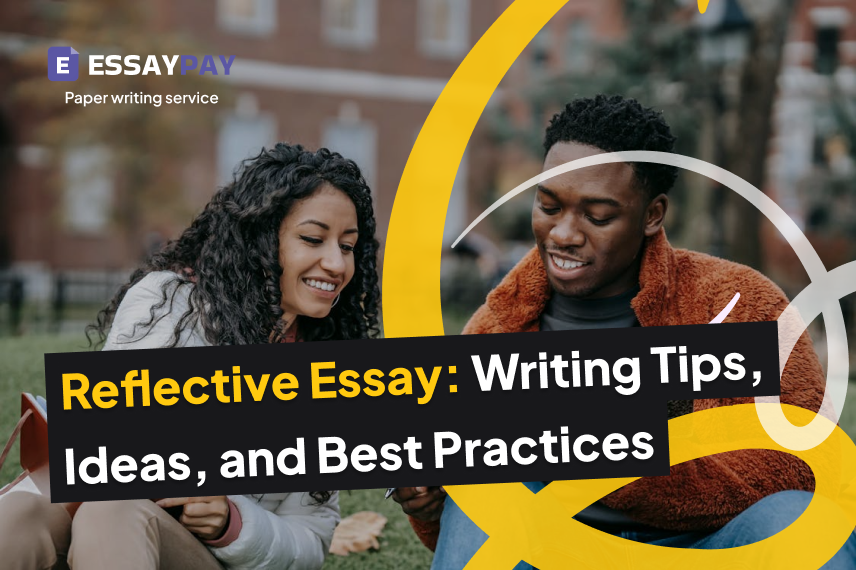Sitting down to write a reflective essay can feel like staring at a blank canvas. There’s this vague expectation that you’ll reveal your “inner self,” but at the same time, you’re supposed to sound structured, thoughtful, and academic. For many students, that’s where the panic begins. What even is a reflective essay? How do you start without sounding artificial? And how do you stretch your thoughts into a coherent 2-page reflective essay–or longer–without wandering off-track?
This guide isn’t just about rules or formulas. It’s written with the messy, real experience of someone who has read, graded, and written more reflective essays than they can count. It’s about understanding what a reflective essay truly is, how to make it yours, and how to navigate common stumbling blocks while still producing something thoughtful, readable, and–dare I say it–original.
What Is a Reflective Essay?
At its core, a reflective essay is a conversation with yourself, but one that’s shaped for an audience. Unlike a research essay that’s about facts, dates, or experiments, a reflective essay is about experience, thought, and insight. It asks, “What did I learn?” but also, “Why does it matter?”
Think of it as the crossroads between storytelling and analysis. You’re narrating an experience but also interrogating it. Did volunteering at a local animal shelter change your perspective on empathy? Did failing a midterm make you rethink your study habits–or your self-image? That’s the raw material.
A reflective essay is not a diary entry. You’re not just writing “I felt sad, then I was happy.” You’re connecting your personal experience to broader themes–learning, growth, challenges, or human behavior. And that’s what gives it weight.
Why Students Struggle
A lot of students stumble here. Some freeze because they think everything must be profound. Others write freely but produce something closer to a journal than an essay. That’s where reflective essay writers can be handy, not to do the work for you, but to clarify structure, flow, and focus.
How to Start a Reflective Essay
The opening matters more than many students realize. A reflective essay isn’t about grandiose claims–it’s about honesty and curiosity. Here are some practical ways to start:
- A vivid scene or memory: Begin in the middle of an experience. “I remember the first time I tried to cook for my roommates. The kitchen smelled like burnt toast, and I realized my patience had limits I didn’t know existed.” Immediately, the reader is in your world.
- A question: Ask something you genuinely pondered during the experience. “Why does failure feel heavier when it’s witnessed by peers?”
- A statement of reflection: Sometimes, starting with insight works. “Learning to navigate group projects taught me more about negotiation than any textbook ever could.”
Once the hook is in place, you can transition into context. Explain briefly what the experience was, why it matters, and set the stage for deeper reflection.
Building a Reflective Essay Outline
Even though reflection is personal, structure matters. A reflective essay outline is your scaffolding. Without it, your essay can meander or repeat itself. Here’s a practical outline that works for most essays:
| Section | Purpose | Tips |
| Introduction | Hook + context + thesis | Open with a scene, question, or insight. Include your thesis statement for reflective essay, e.g., “This experience taught me the value of patience and collaboration.” |
| Body Paragraph 1 | Describe the experience | Focus on sensory details and actions. Avoid summarizing too broadly. |
| Body Paragraph 2 | Analyze the experience | Reflect on what it meant. Connect to personal growth or understanding. |
| Body Paragraph 3 | Connect to broader context | Link your experience to larger lessons, societal issues, or academic ideas. |
| Conclusion | Reflective takeaway | Summarize insights, suggest future implications, leave the reader thinking. |
This structure is flexible. A 2-page reflective essay may have shorter paragraphs, while longer essays allow for more analysis. The key is logical flow and authentic insight.
Tips for Writing the Body
When you move into the essay’s body, think of it as a conversation with yourself. Here’s how to make it work:
- Be specific: Concrete details make your reflection credible. Instead of saying, “I learned teamwork,” describe the moment you realized you had to compromise or step up.
- Show internal conflict: Reflection is most interesting when it reveals tension or growth. Struggle, confusion, mistakes–these are gold.
- Connect to theory or people: You can reference famous figures, companies, or studies to strengthen your point. For example, reflecting on leadership might include insights from Sheryl Sandberg or Elon Musk. Learning from failure? Thomas Edison’s famous quote about 1,000 failed attempts can illustrate persistence.
- Blend narration and analysis: Alternate between storytelling and reflection. It shouldn’t read like a report or memoir; it’s both.
Common Mistakes to Avoid
- Too vague: General statements like “It was a good experience” add nothing.
- Overly dramatic: Reflection isn’t therapy. Emphasize learning, not just emotion.
- No thesis: Even reflective essays benefit from a thesis statement–it guides your insight.
Brainstorming Reflective Essay Topics
Picking the right topic can make or break your essay. Here are some ideas that work across high school and college levels:
- Personal growth experiences: first job, volunteering, sports achievements.
- Academic challenges: first major exam, group projects, difficult assignments.
- Travel or cultural experiences: studying abroad, learning a new language, immersion in a new environment.
- Life-changing events: family dynamics, mentorship, community involvement.
- Unexpected failure or mistake: what went wrong, what was learned.
If brainstorming stalls, even a reflective essay writing service can help spark ideas or provide guidance without doing the work for you. Use these responsibly–they’re about learning structure, flow, and depth.
Crafting a Thesis Statement for Reflective Essay
A strong thesis statement is deceptively simple. It’s your insight distilled into a sentence that guides your essay. For example:
- Weak: “I learned a lot from volunteering.”
- Strong: “Volunteering at the local shelter taught me empathy, patience, and the value of community engagement in unexpected ways.”
A thesis anchors your reflection and helps you avoid wandering into unrelated tangents. It also gives your reader a clear sense of what your essay is about and why it matters.
Example of a 2-Page Reflective Essay Flow
Let’s imagine a student writing a 2-page reflective essay on public speaking. Here’s a rough conceptual flow:
- Introduction: Hook with a story of the first speech in front of the class; introduce thesis about overcoming fear and discovering self-confidence.
- Body Paragraph 1: Describe preparation, mistakes, and initial panic.
- Body Paragraph 2: Reflect on coping strategies, mentor advice, and personal insights.
- Body Paragraph 3: Connect the experience to broader life lessons–communication, leadership, and self-awareness.
- Conclusion: Summarize insights and suggest how these skills will apply in future scenarios.
Notice how even in a short essay, reflection is layered–experience, analysis, and broader meaning.
Beyond the Basics: Thinking Unconventionally
Here’s where it gets interesting. Reflection doesn’t have to follow a rigid formula. Students often gain the most insight when they:
- Include contradictory feelings: “I was proud, embarrassed, and relieved all at once.” Complex emotions are authentic.
- Ask uncomfortable questions: What would you have done differently? How does this experience challenge your assumptions?
- Make indirect connections: Maybe a failed group project taught patience, which later helped in a family conflict. Reflection can leap across contexts.
Sometimes, the most compelling essays are those that veer off the expected path, showing genuine thought and vulnerability.
Using Examples and Entities to Strengthen Reflection
Injecting real-world references can make reflection richer and more relatable. Examples:
- Comparing problem-solving in a class project to Tesla’s iterative innovation process.
- Discussing teamwork lessons learned during a soccer match alongside Messi or Serena Williams’ collaborative strategies.
- Reflecting on ethical dilemmas at work with reference to Google’s AI principles or a well-known case study.
These references do more than show knowledge–they anchor your reflection in the wider world, proving that personal experience intersects with broader human experience.
The Power of Reflection
Writing a reflective essay isn’t just an assignment–it’s a chance to examine, question, and articulate your growth. It teaches something that rote assignments often can’t: introspection. You realize how experiences–mundane or extraordinary–shape your thinking, behavior, and future decisions.
A final reflection could be indirect: you might end with a scene, a thought-provoking question, or a realization. For instance:
“Standing in front of the classroom again, I noticed the fear had thinned, replaced by anticipation. I didn’t just survive the speech–I understood a little more about myself.”
That’s the essence of a reflective essay: learning in progress, captured on paper.
Quick Recap and Checklist
Before submitting, ensure your essay:
- Has a clear thesis statement for reflective essay
- Follows a reflective essay outline
- Includes concrete experiences and analysis
- Connects insights to broader life lessons or contexts
- Maintains a personal, authentic tone
- Meets length expectations (2-page reflective essay for shorter assignments)
- Explores reflective essay topics thoughtfully
Everything You Need to Know About Reflective Essays
1. How long should a reflective essay be?
While many assignments suggest a 2-page reflective essay, the length often depends on your instructor’s requirements. Focus on quality and depth of reflection, not just word count.
2. Can I use first-person pronouns in a reflective essay?
Yes! Reflective essays are personal, so using “I” is not only acceptable but encouraged. Just make sure your reflections are meaningful and tied to your growth or insights.
3. Do I need references in a reflective essay?
It depends. If you refer to theories, research, or famous examples, include citations. But personal experiences generally don’t require references.
4. How do I make my reflective essay sound authentic?
Be honest about your feelings, mistakes, and successes. Avoid over-polishing or trying to impress. Readers (and graders) value real insights over perfect language.
5. Can a reflective essay be humorous?
Absolutely. Humor can make reflection engaging, as long as it supports your point and doesn’t undermine your insight. Subtle, self-aware humor works best.
6. How do I handle negative experiences in a reflective essay?
Focus on lessons learned and growth. Negative experiences are often the richest for reflection because they reveal how you change, adapt, or understand yourself better.
7. Is a reflective essay only about personal experiences?
Not necessarily. You can reflect on books, films, events, or even interactions with others, as long as you analyze and connect them to your thoughts, feelings, or development.




